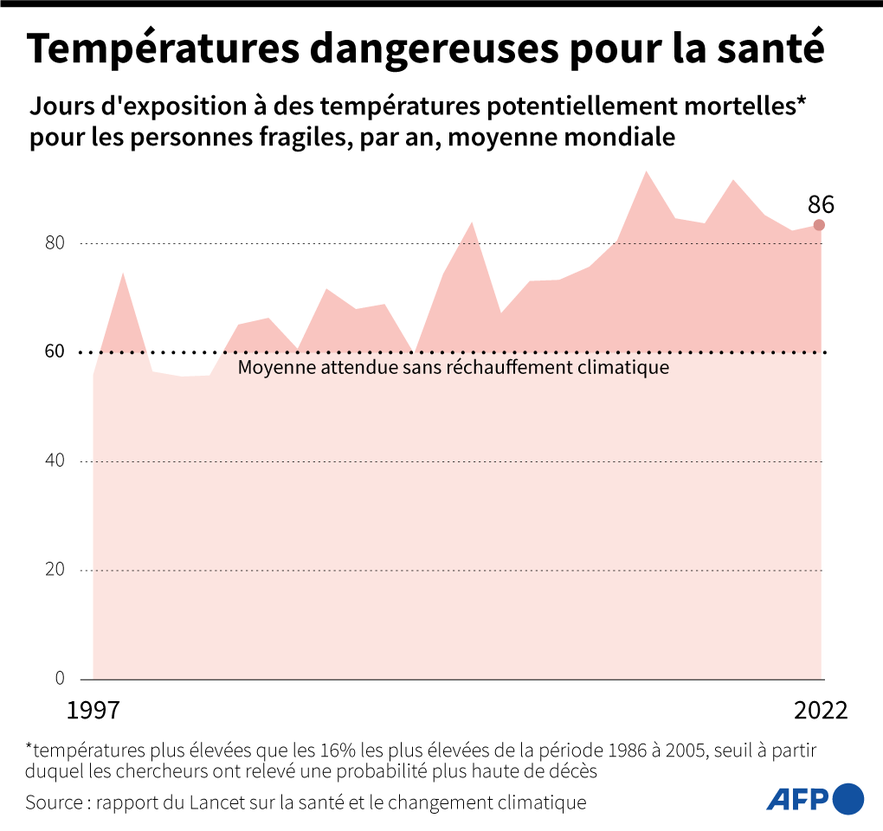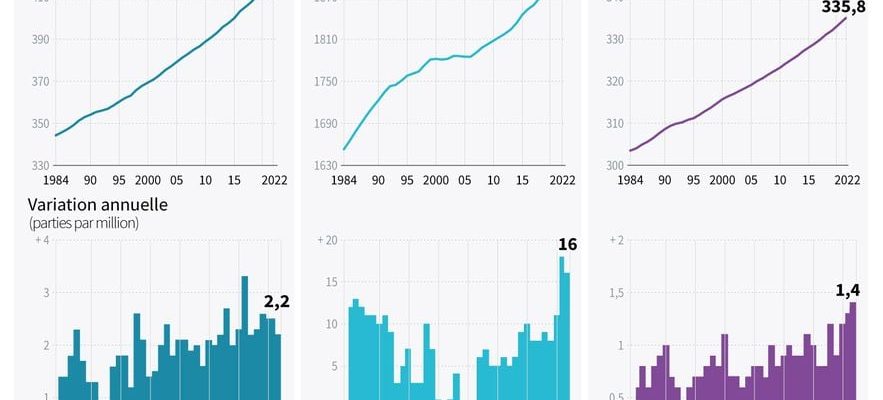It’s a real “countdown on health and climate change”, like the title The Lancet. The British scientific journal published this Wednesday, November 15, the eighth version of its reference report on the consequences of global warming.
Free access, this study, updated every year, combines the work of 114 researchers from around the world. A reference document on global warming, which once again predicts that “the health of humanity is in serious danger”: five times more people are likely to die from extreme heat, if temperatures increase by 2 °C by 2050. A still optimistic scenario, while greenhouse gas emissions reached records last year, the UN warned this Wednesday, calling for an urgent reduction in the consumption of fossil fuels. .
Record levels of greenhouse gases in 2022
© / afp.com/Maxence D’AVERSA, Laurence SAUBADU
Explosion in the number of heat-related deaths over the past 30 years
Beyond making dramatic projections about our future, this eighth version of The Lancet’s “countdown” firstly echoes our present. Indeed, the report makes this projection based on the recent increase in heat waves dangerous for health. In 2022, people around the world will be exposed to an average of 86 days of life-threatening temperatures.
Faced with ever-hotter summers, mortality among populations at risk has exploded over the past 30 years. As this report reveals, the number of people over 65 who died due to heat jumped by 85% between 1991-2000 and 2013-2022. Thus, “elderly people and infants are now exposed to twice as many heatwave days per year as between 1986 and 2005”, reports the American daily New York Times in an article dedicated to the study. A phenomenon which was again observed in 2023, which promises to be the hottest year in the history of humanity, according to the European Climate Observatory.

Chart showing the number of days per year with hazardous temperature for health from 1997 to 2022 according to The Lancet Countdown on health and climate change 2023 report
© / SABRINA BLANCHARD / AFP
“The effects observed now could be just an early symptom of a very dangerous future,” said the report’s executive director Marina Romanello. The study predicts that warming of 2°C by 2100 would cause unavoidable excess mortality: the number of heat-related deaths is expected to increase by 370% by 2050, an increase of 4.7 times. A scenario which could nevertheless worsen, while average earth temperatures are currently on track to reach 2.7°C by 2100.
A devastating butterfly effect in poor countries
Especially since fatal heat is only one of the multiple threats to human health resulting from our increasing use of fossil fuels, according to this study. The report presents 47 indicators of increased mortality linked to the global rise in temperatures. Excessive heat first causes more frequent droughts, putting millions of people at risk of starving. According to The Lancet “countdown” projections, around 520 million more people would find themselves in moderate or severe food insecurity by 2050.
Another important consequence: the proliferation of mosquitoes. With the heat, these travel further and further and carry infectious diseases to new areas. This is particularly the case in Jamaica: the country is going through an unprecedented dengue epidemic, recalls Jamaican researcher and co-author of the report Georgiana Gordon-Strachan. The transmission of this disease could also jump by 36% by the middle of the century, again according to the study.
These multiple impacts of climate change are increasingly weighing on health systems, which are struggling to cope. More than a quarter of the cities studied by the researchers expressed fear that their health facilities would be overwhelmed within a few years. A double penalty which hits “the inhabitants of the poorest countries” hardest, specifies Georgiana Gordon-Strachan: “often less responsible for greenhouse gas emissions”, they nevertheless have “less financial and technical capacity to adapt” to the consequences of global warming.
A “huge human cost” linked to climate inaction
“Humanity faces an unbearable future,” said United Nations Secretary General Antonio Guterres in response to the publication of The Lancet report. However, the grim projections of this annual study do not seem sufficient to convince States, deplore the authors of the report.
British researcher and climate risk specialist Dann Mitchell regretted to the Science Media Center foundation that previous “catastrophic” health warnings had “failed to convince governments to reduce carbon emissions sufficiently to meet the first objective of the Paris agreement, i.e. +1.5°C”. The study also criticizes companies and banks that still heavily subsidize and invest in fossil fuels, fueling global warming. Despite growing calls for global action, energy-related carbon emissions reached new highs last year.
A few weeks before the international climate conference (COP28) in Dubai, the conclusions of the report could therefore influence international discussions on the measures to be adopted to reduce the consequences of heat on human lives. For the first time, a day will be dedicated to health, December 3. But part of the “very precious years” lost can never be made up for, nuance researcher Marina Romanello at New York Times : “The loss of life, the consequences that people suffer, are irreversible.”
